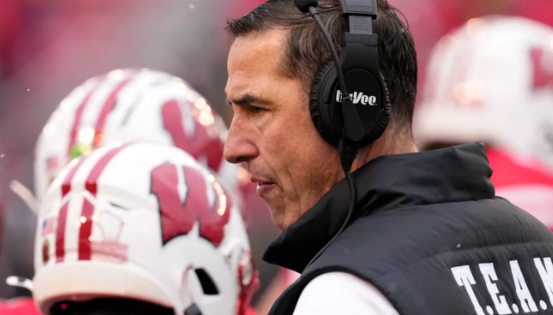The landscape of college football is undergoing rapid changes, often for the worse. The transfer portal, intended to offer players greater freedom, has become contentious, with tampering emerging as a significant concern.
Wisconsin Badgers head coach Luke Fickell openly discussed the difficulties this new environment has posed for his team. Currently, the Badgers face 23 outgoing transfers, including the unexpected exit of freshman cornerback Xavier Lucas, who decided to leave after just one season in Madison. Lucas’ choice took fans by surprise and highlights the behind-the-scenes dynamics at play.
Fickell stated on 97.3 The Game, “I think every kid is being recruited right now. The issue is not just the kids in the transfer portal, and that’s probably the most alarming—it’s become nearly impossible to predict where you are headed due to the open lines of communication.”
Fickell emphasized concerns about rival programs and coaches contacting athletes still on their current teams, offering NIL deals and other incentives to entice them away—this is a harsh reality of modern college football.
So, what is the solution? For Fickell, it begins with focusing on his own program. “It’s got to start with your own program. You need to find a way to progress while retaining your own team, focusing particularly on the players you need to keep,” he explained.
This emphasis on retention has become increasingly challenging for coaches. An environment once rooted in relationships and player development now resembles a free agency model. Programs are left uncertain about who may be targeted next, whether they can adequately replace those players, and how to navigate a framework that lacks proper safeguards and consistent rules.
While all teams face a salary cap on available funds, the amounts vary significantly across different programs. Tampering is not limited to Wisconsin; it is a widespread issue within college football, and the situation shows little sign of improvement.
Other teams are actively pursuing players not currently in the portal, enticing them with lucrative NIL deals and gaming the system to their advantage. This has led to diminished respect among programs, leaving coaches like Fickell in a continuous struggle to protect and strengthen their rosters each year.
Fickell remarked, “It’s likely going to have to become so dysfunctional that they find a way to impose more structure. I don’t want to simply complain about it, as doing so can result in missing valuable opportunities. It’s difficult for us, but it’s equally tough for the players to navigate.”
Although the transfer portal was meant to empower student-athletes by providing more choices, its current state is unsustainable, placing programs like Wisconsin in a challenging position each year. As tampering increases, Fickell’s observations underscore the need for regulations to ensure stability and accountability across the FBS. While player compensation has long been necessary, the absence of clear guidelines for NIL deals and the transfer portal is detrimental to college football. A unified set of rules, possibly including contracts, is essential.
Entering his third season with the Badgers after a 5-7 record that ended Wisconsin’s 22-year bowl streak, Fickell has a 12-13 record thus far as he works to shape his vision for the program amid this turbulent landscape.
